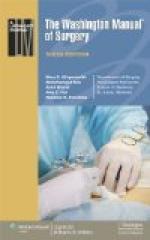Treatment.—A patient suffering from shock should be placed in the recumbent position, with the foot of the bed raised to facilitate the return circulation in the large veins, and so to increase the flow of blood to the brain. His bed should be placed near a large fire, and the patient himself surrounded by cotton wool and blankets and hot-bottles. If he has lost much blood, the limbs should be wrapped in cotton wool and firmly bandaged from below upwards, to conserve as much of the circulating blood as possible in the trunk and head. If the shock is moderate in degree, as soon as the patient has been put to bed, about a pint of saline solution should be introduced into the rectum, and 10 to 15 minims of adrenalin chloride (1 in 1000) may with advantage be added to the fluid. The injection should be repeated every two hours until the circulation is sufficiently restored. In severe cases, especially when associated with haemorrhage, transfusion of whole blood from a compatible donor, is the most efficient means (Op. Surg., p. 37). Cardiac stimulants such as strychnin, digitalin, or strophanthin are contra-indicated in shock, as they merely exhaust the already impaired vaso-motor centre.
Artificial respiration may be useful in tiding a patient over the critical period of shock, especially at the end of a severe operation.
Failing this, the introduction of saline solution at a temperature of about 105 F. into a vein or into the subcutaneous tissue is useful where much blood has been lost (p. 276). Two or three pints may be injected into a vein, or smaller quantities under the skin.
Thirst is best met by giving small quantities of warm water by the mouth, or by the introduction of saline solution into the rectum. Ice only relieves thirst for a short time, and as it is liable to induce flatulence should be avoided, especially in abdominal cases. Dryness of the tongue may be relieved by swabbing the mouth with a mixture of glycerine and lemon juice.
If severe pain calls for the use of morphin, 1/120th grain of atropin should be added, or heroin alone may be given in doses of 1/24th to 1/12th grain.
#Collapse# is a clinical condition which comes on more insidiously than shock, and which does not attain its maximum degree of severity for several hours. It is met with in the course of severe illnesses, especially such as are associated with the loss of large quantities of fluid from the body—for example, by severe diarrhoea, notably in Asiatic cholera; by persistent vomiting; or by profuse sweating, as in some cases of heat-stroke. Severe degrees of collapse follow sudden and profuse loss of blood.
Collapse often follows upon shock—for example, in intestinal perforations, or after abdominal operations complicated by peritonitis, especially if there is vomiting, as in cases of obstruction high up in the intestine. The symptoms of collapse are aggravated if toxin absorption is superadded to the loss of fluid.




